- Home
- David Lubar
Teeny Weenies: Fishing for Pets
Teeny Weenies: Fishing for Pets Read online
Begin Reading
Table of Contents
About the Author and Illustrator
Copyright Page
Thank you for buying this
Tom Doherty Associates ebook.
To receive special offers, bonus content,
and info on new releases and other great reads,
sign up for our newsletters.
Or visit us online at
us.macmillan.com/newslettersignup
For email updates on David Lubar, click here.
For email updates on Bill Mayer, click here.
The author and publisher have provided this e-book to you without Digital Rights Management software (DRM) applied so that you can enjoy reading it on your personal devices. This e-book is for your personal use only. You may not print or post this e-book, or make this e-book publicly available in any way. You may not copy, reproduce, or upload this e-book, other than to read it on one of your personal devices.
Copyright infringement is against the law. If you believe the copy of this e-book you are reading infringes on the author’s copyright, please notify the publisher at: us.macmillanusa.com/piracy.
For Brian Selander,
who never ceases to amaze me as he finds new ways to make the world a better place.
FISHING FOR PETS
I never win anything. I don’t know why I even try. But I really wanted a goldfish. And you could win one at the carnival just by getting a Ping-Pong ball into one of the small bowls stacked up on a table. I tried and I tried, but they kept bouncing off the edges.
“I give up!” I shouted. I hurled my last ball at the bowls as hard as I could. It smacked one on the rim, shot straight up, smacked the top of the booth, shot back down, bounced up again, then fell into a tiny golden bowl all the way in the back.
“Winner!” the guy in the booth shouted. “You win the grand prize! Nobody has done that in ages.” He bent over and reached under the counter.
“I just want a goldfish,” I said.
Before I could explain anything more, he straightened up and plunked something warm and furry into my arms.
I stared at it. It stared back.
“That’s a monkey,” I said.
“Yes, indeed,” the man said. “And you are one lucky kid.”
“But…”
I tried to think up the best way to explain that my parents would never let me bring home a monkey.
“Tell them you won it,” the man said. “We’re closing up in an hour. We’ll be gone by the time they come back. They’ll have to let you keep it.”
I wasn’t sure I wanted to trick my parents. But how could I say no to my very own monkey? I really couldn’t.
On the way home, I decided to name him Snickers, because that was my favorite candy bar. He seemed to like that.
“Look what I won!” I said as I walked into my house.
Dad stared. Mom stared.
“That’s a monkey,” Mom finally said.
“I think you’re right,” Dad said.
“Take it back,” Mom said.
“I can’t.” I looked at the clock on the wall. “The carnival is closing soon.”
“We’ll see about that,” Dad said. He grabbed my hand and headed out the door.
I clutched Snickers and raced along next to Dad. The carnival was still open when we got there.
“We want to return this monkey,” Dad said.
“Sorry, all prizes are final.” The man pointed to a sign that pretty much contained those same words.
“I don’t care what the rules are,” Dad said. “Take back this monkey.”
The man leaned forward. “I’ll tell you what. I really can’t do that. But here’s what I’ll do.” He held up a Ping-Pong ball. “I’ll give you a free play.”
Dad snatched the ball out of the man’s hand and flung it past him as hard as he could. “I don’t want a free play!”
The ball smacked into the rim of one of the bowls, shot in the air, bounced off the ceiling of the booth, smacked another bowl, and another, and then rolled around the rim of a final bowl three times before falling into the water.
The bowl was golden. So was the water.
“Winner!” the man shouted. “Wait right here.” He dashed behind the booth.
“Run,” I told Dad.
But before we could skitter away, the man came back holding hands with a small gorilla. And a small gorilla is a very big animal.
“I don’t—”
Whatever else Dad was going to say got cut off as the gorilla leaped into his arms and gave him a kiss on the cheek.
We staggered home.
Mom was not pleased.
“We’ll see about this,” she said as she stormed off toward the carnival.
“I hope it’s an orangutan,” I said as I watched her leave.
“A gibbon would be nice,” Dad said.
She came back with a goat.
PACK RATS
The Wykowski triplets, Edith, Mercy, and Rhea, were struggling up Bard Street. Three things added to their struggle. They were the smallest kids at Chester Burnett Elementary School. Bard Street was the steepest street in town. And Bard Street was the only way to get home from school. They’d received new textbooks for all of their subjects, and had to take them home to get covered. Bent under the weight of their backpacks, they fought for every small step.
Brawler Einhorn had no trouble walking up the hill. He was the fifth-strongest kid at Chester Burnett Elementary School, and could have almost carried all three Wykowski backpacks, along with all three Wykowski kids. But Brawler wasn’t the helpful sort. Quite the opposite, he was a bit mean. (Some of his classmates felt this was caused by his failure to even make the top three when it came to strength.) He was also in a bad mood because he’d had to stay after class to get a lecture about paying more attention.
So he started out way behind the triplets. But he caught up quickly enough as he plowed his way toward the top of the hill. He could have passed them and kept going. But their struggle caught his attention.
He walked past them, then turned around.
“What’s the matter?” he asked, using the sort of voice one would use with a baby. “Too heavy?”
The triplets nodded, all at once, in a slow and creepy way. They stared at him, unblinking, with identical grim expressions that would have given a bit of a chill to anyone who actually paid attention to other people.
Brawler laughed. “Weakling,” he said, poking Edith in the shoulder.
It wasn’t a hard poke, but Edith was already off balance. She let out a gasp as she toppled backward.
Brawler let out a laugh. He hadn’t expected such a rewarding and amusing sight. “Next?” he asked, holding up the same finger he’d used to topple Edith.
Mercy shook her head and took a step backward.
That was a mistake. The weight of her pack pulled her back. She staggered for three more steps, then fell, just like her sister.
Brawler leaned forward, putting his face so close to Rhea’s, their noses almost touched.
“Boo!” he shouted.
Rhea jumped in the only available direction.
That, too, was a mistake. She followed pretty much the same path as Mercy, also ending up on her back.
“Hah!” Brawler cried. “That was awesome.”
He expected them to quiver in fear, or start bawling. As spooky as they looked, he didn’t expect them to point at him and chant.
“Round and round. What goes around comes around. Down and down!”
Brawler frowned as an unfamiliar sensation spread through his stomach. He’d rarely felt fear. Shuddering, he turned away from the triplets and headed for the top of the
hill.
He didn’t notice anything at first. Then, another unfamiliar sensation tugged at him. His backpack felt heavy. “It’s just my imagination,” he said out loud. He hunched his shoulders and continued walking.
The pack grew even heavier.
He looked ahead. The top of the hill was still about fifty yards away.
Each step was harder than the last.
Finally, with the top of the hill just a few feet away, he realized he didn’t have the strength for another step.
He tried to take off the backpack. But the straps were digging so deep into his shoulders, he couldn’t slip free.
Someone walked past him.
It was the triplets.
“Help!” Brawler cried.
They turned to face him, but didn’t say a word. The hill was so steep near the top that the triplets’ eyes were level with Brawler’s trembling chin.
“Please…” Brawler said. “I’ve learned my lesson.”
Edith shook her head. “No, you haven’t.”
“Not quite yet,” Mercy said.
“But soon,” Rhea said.
All three reached out toward Brawler’s nose with a forefinger and tapped him ever so lightly.
“Yargggg!” Brawler howled as he toppled backward. He hit the sidewalk, and then slid, throwing sparks from the zipper on his backpack as he shot down the pavement toward the bottom of the hill. Halfway down, the backpack burst open. Books and papers spilled out. By the time Brawler reached the bottom of the hill, his backpack was empty, and he was able to get back up on his feet.
Three sets of eyes watched from the top of the hill as Brawler started to make his way back up. On the way, he gathered up his spilled possessions and crammed them into the backpack.
“That was fun,” Rhea said.
“I hope he learned his lesson,” Edith said.
“If not, we can try again next time,” Mercy said.
“In that case, I hope he didn’t learn his lesson,” Edith said.
They all laughed. Then they turned away from Brawler and headed home.
RISING WATERS
Lisa’s father paused at the door and turned back one more time. “Are you sure you’re okay with this?” he asked.
Lisa nodded. “We’re fine. Go ahead. It’s not like we’re little kids.” She wished he’d stop worrying. That just made her nervous.
“We’ll be right back,” her mom said. “We want to get some groceries before the storm hits.”
“Who’s in charge?” Lisa’s twin brother, Dennis, asked, looking up from the fishing reel he was cleaning.
“Both of you,” Lisa’s mom said. She glanced toward the sky, then said, “We’d better hurry.”
Lisa watched her parents drive down the dirt road to the bridge. The car crossed the river, then climbed the hill toward the highway that led to the grocery store. It was noon, but heavy clouds had turned the world dark as an unlit basement. “Nobody needs to be in charge,” Lisa said to Dennis. This was the first time they’d been left alone at the cabin. At home, with neighbors all around, it was not a big deal if her folks had to run an errand. But here, in the woods by the river, they were alone.
“Something could happen,” Dennis said. “Then I’d have to be in charge, because I know all about the woods. I was a Scout, and you never were.”
“Okay,” Lisa said. “If we have an emergency and we need a fish caught, the job is yours.”
Dennis started to say something, but his words were blasted away by a flash and a boom. Before the echo of the thunder had died in Lisa’s ears, another harsh sound filled the air. Heavy rain was falling, smashing the ground as if an ocean had been overturned and dropped from the sky.
Lisa shuddered and stepped back, closing the door. I hope they’re safe, she thought, wondering if her parents had reached the store yet.
“Big storm,” Dennis said.
“Big storm,” Lisa agreed, “but it can’t last long.” She looked out the window. Something was so wrong that, at first, she didn’t even see it. When she realized what had happened, she gasped. The bridge was gone from sight, covered by the river. An angry, churning rush of water was spilling over the banks, rising to the dirt road, racing toward the cabin.
“We have to get out,” she told Dennis. But where? Her parents were across the river. The bridge was underwater. There was nothing behind them but flat woodland. It would all be flooded if the river continued to rise. “Maybe the roof,” she said, thinking out loud. Lisa looked out again. The water was higher, lapping at the ground just a few feet from the cabin.
“Don’t be silly,” Dennis told her. “We’ll be safe here. The river can’t rise that high. It’s never really flooded the cabin.”
“Never?” Lisa asked.
“Nope.” Dennis pointed to the wall near the floor. “See where the color of the wood is different? That’s as high as it ever went. And that only happened once. Dad told me it was back when he was a kid. So relax.”
“Okay.” For a moment, Lisa felt better. But she couldn’t help looking out the window. The river didn’t seem to know it wasn’t supposed to go much higher. It was moving toward the cabin at a steady rate. The rain fell harder.
“Dennis,” Lisa said, walking to the couch, “take a look. The water is almost here.”
“Don’t worry about it.” He didn’t even look up.
Lisa returned to the window. As she looked out, she gasped. Everything was happening too quickly. The water was already over the three steps that led down from the front porch. She opened the door to look out.
“Keep that shut,” Dennis said.
Lisa closed the door, hoping the solid piece of oak could hold back the water. Outside, the river lapped against the base of the door. A small trickle leaked inside, but the seal was fairly tight, so not too much got in.
The thunder had moved past them and was now rumbling in the distance, but the rain continued. Lisa knew the river was not going to stop rising. She had to make a decision. “Dennis, we need to do something, and we need to do it now. Take a look at this.”
Dennis gave her an annoyed stare and walked to the window. He looked out, and then he looked down toward where the rising water beat against the cabin. For a moment, he said nothing.
Lisa waited, then she asked, “What should we do?”
“I don’t know.”
“We have to make a decision,” she told him.
He shook his head. “We’ll just stay here. Everything will be fine.”
“No.” She scanned around the small cabin, searching for anything that could help them. There was a couch, a couple of beds, and a small table. She looked at the door again. The river slapped against it, an unwelcome stranger demanding to get in. She realized the river was about to get its wish.
“Help me,” she said, running for the toolbox her parents kept in the hall closet. She came back with a hammer and screwdriver. She used the tools to knock out the hinge pins from the door.
“What are you doing? You’ll let the water in,” Dennis shouted.
“It’s our only chance.” She pulled at the door. “Help me,” she said again.
“But we can’t—”
“Help me!”
Dennis pulled with her. The old oak door finally came free with a shriek and a groan. Water burst through the opening, quickly claiming the cabin floor. The door twisted in their hands. “Let’s get it outside,” Lisa said.
They wrestled the door to the porch. Lisa reached back and grabbed the broom. “Drop the door and get on top of it,” she said.
Dennis followed her orders. They leaned the door over, then let go. It hit the water, sank for an instant under the force of its fall, then bobbed on the surface of the water. Lisa and Dennis climbed onto the rocking platform. The water was still rising. Looking back, Lisa saw it was already a foot deep inside the cabin. She could actually see it climbing the walls.
Lisa used the broom to push away from the cabin. In an instant, they were moving
with the current and there was no chance to change her mind. “I hope I made the right decision,” she said, wondering whether panic had driven her to make a serious mistake.
Dennis got a strange look on his face. “You were right,” he said, pointing behind them. Lisa looked back. Again, what she saw was so wrong that, at first, she didn’t really see it. The cabin was leaning. It was giving in to the force of the water. In another instant, with a cry of ripping wood, it was torn from the ground and swept away.
A moment later, a light sliced through the dark, catching the two of them as they clung to the door on the river. “Lisa?” a voice called. “Dennis?”
“Here!” she shouted. There was the sound of an outboard motor. She saw her parents, along with the man who owned the store. In another moment, Lisa and Dennis were climbing into the safety of the boat. She watched as the door was carried away by the water.
“We were so worried,” her mother said. “But I knew I could count on you kids. You did the right thing.”
Dennis shook his head. “Lisa did the right thing,” he said.
“Thanks,” Lisa said. She huddled against her parents as the boat took them across the rising waters to safety.
THE WISH LIST
“Class, let me be the first to wish all of you a wonderful summer,” Ms. Barjani said. “I hope you have all made lots of wonderful plans.”

 Teeny Weenies: My Favorite President
Teeny Weenies: My Favorite President Teeny Weenies: The Intergalactic Petting Zoo
Teeny Weenies: The Intergalactic Petting Zoo Teeny Weenies: The Eighth Octopus
Teeny Weenies: The Eighth Octopus Emperor of the Universe
Emperor of the Universe Teeny Weenies: The Boy Who Cried Wool
Teeny Weenies: The Boy Who Cried Wool Teeny Weenies: Fishing for Pets
Teeny Weenies: Fishing for Pets Teeny Weenies: Freestyle Frenzy
Teeny Weenies: Freestyle Frenzy Numbed!
Numbed!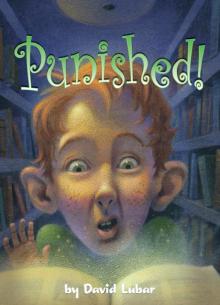 Punished!
Punished!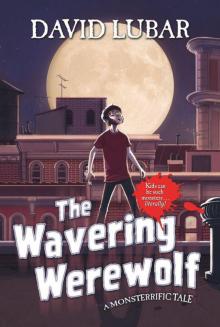 The Wavering Werewolf: A Monsterrific Tale (Monsterrific Tales)
The Wavering Werewolf: A Monsterrific Tale (Monsterrific Tales)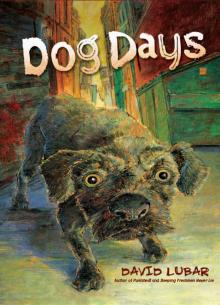 Dog Days
Dog Days Sophomores and Other Oxymorons
Sophomores and Other Oxymorons The Psychozone
The Psychozone My Rotten Life
My Rotten Life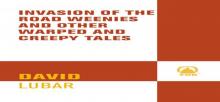 Invasion of the Road Weenies
Invasion of the Road Weenies In the Land of the Lawn Weenies
In the Land of the Lawn Weenies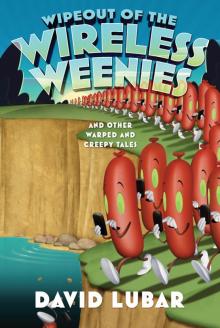 Wipeout of the Wireless Weenies
Wipeout of the Wireless Weenies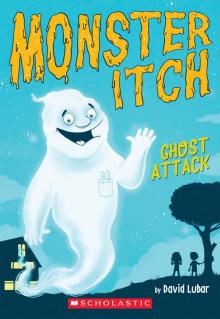 Ghost Attack
Ghost Attack Check Out the Library Weenies
Check Out the Library Weenies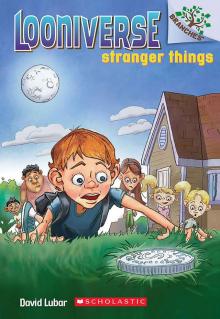 Looniverse #1: Stranger Things (A Branches Book)
Looniverse #1: Stranger Things (A Branches Book)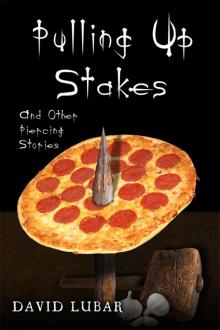 Pulling up Stakes and Other Piercing Stories
Pulling up Stakes and Other Piercing Stories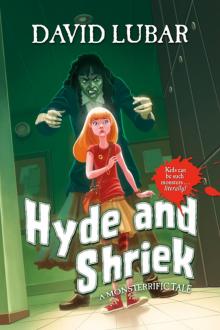 Hyde and Shriek
Hyde and Shriek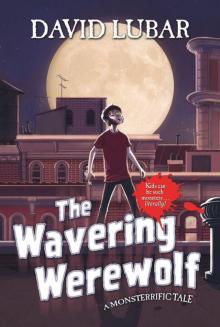 The Wavering Werewolf
The Wavering Werewolf Dead Guy Spy
Dead Guy Spy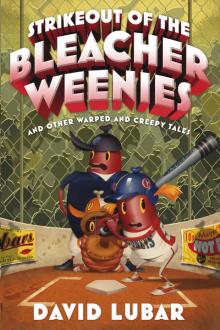 Strikeout of the Bleacher Weenies
Strikeout of the Bleacher Weenies The Big Stink
The Big Stink The Battle of the Red Hot Pepper Weenies
The Battle of the Red Hot Pepper Weenies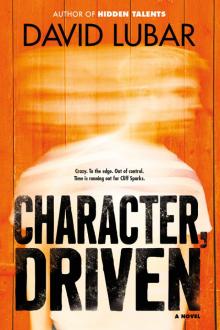 Character, Driven
Character, Driven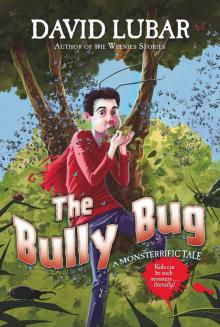 The Bully Bug
The Bully Bug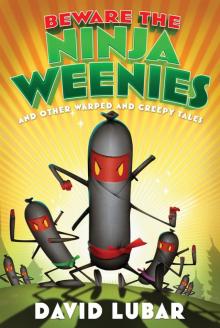 Beware the Ninja Weenies
Beware the Ninja Weenies Extremities: Stories of Death, Murder, and Revenge
Extremities: Stories of Death, Murder, and Revenge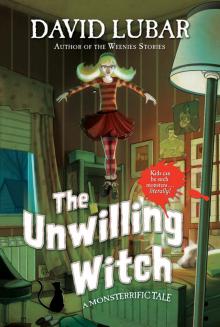 The Unwilling Witch
The Unwilling Witch Goop Soup
Goop Soup Lay-ups and Long Shots
Lay-ups and Long Shots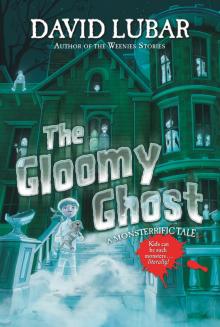 The Gloomy Ghost
The Gloomy Ghost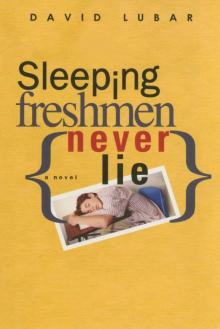 Sleeping Freshmen Never Lie
Sleeping Freshmen Never Lie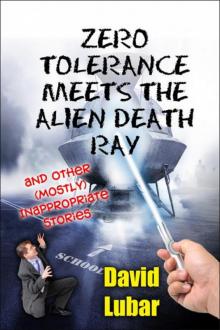 Zero Tolerance Meets the Alien Death Ray and Other (Mostly) Inappropriate Stories
Zero Tolerance Meets the Alien Death Ray and Other (Mostly) Inappropriate Stories Attack of the Vampire Weenies
Attack of the Vampire Weenies Enter the Zombie
Enter the Zombie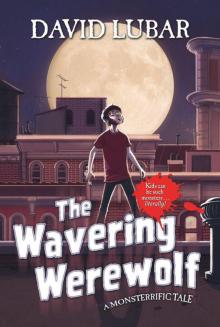 The Wavering Werewolf_A Monsterrific Tale
The Wavering Werewolf_A Monsterrific Tale The Curse of the Campfire Weenies
The Curse of the Campfire Weenies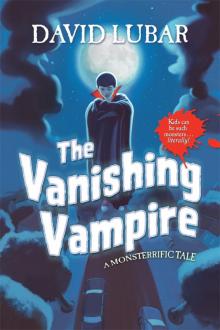 The Vanishing Vampire
The Vanishing Vampire